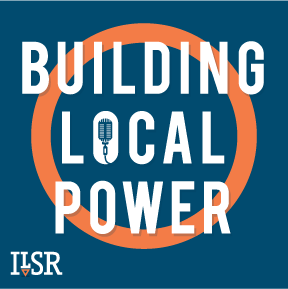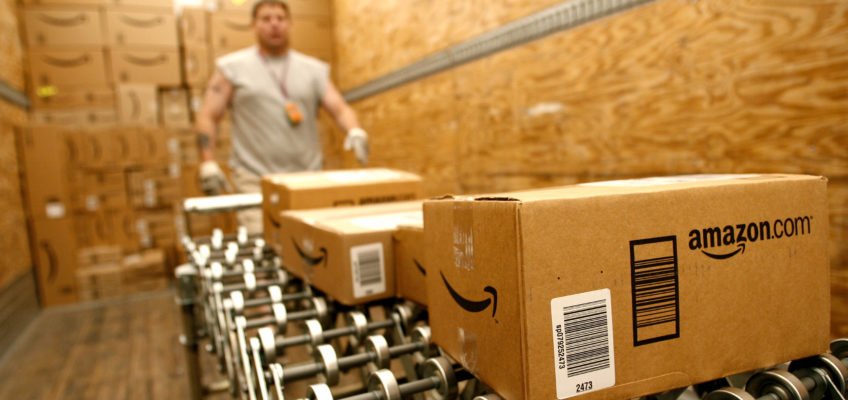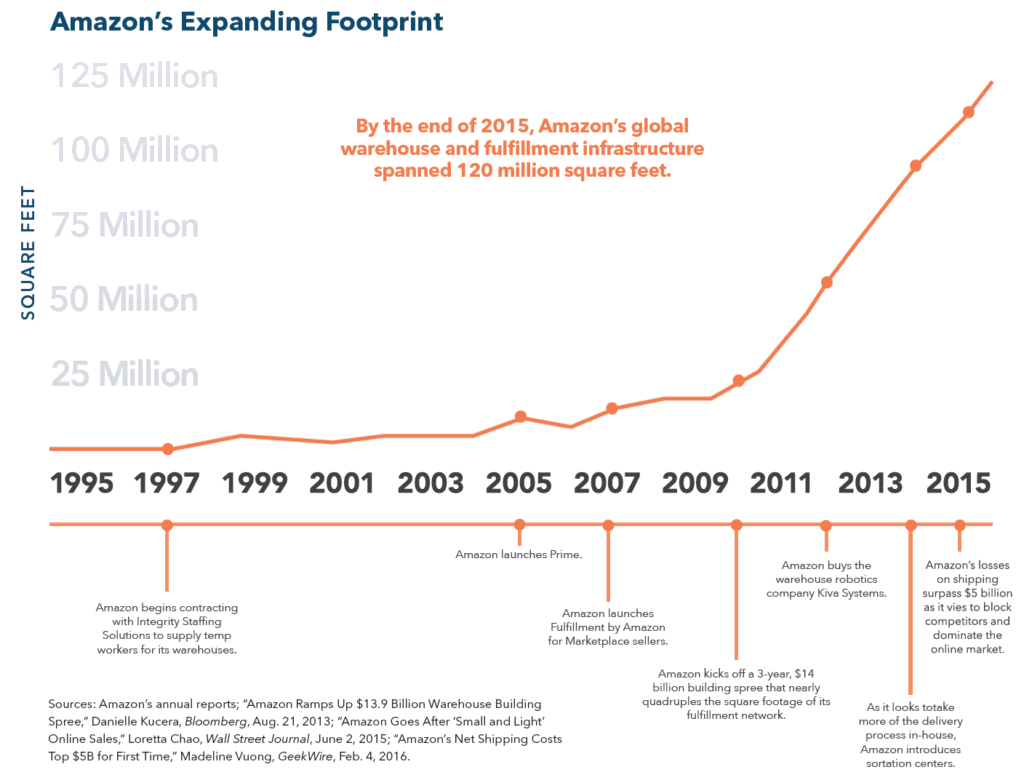Podcast (buildinglocalpower): Play in new window | Download | Embed
Subscribe: RSS
Welcome to episode six of the Building Local Power podcast.In this episode, Chris Mitchell, the director of our Community Broadband Networks initiative, interviews Stacy Mitchell (no relation) ILSR Co-Director and Senior Researcher for the Community-Scaled Economies initiative about their latest report: Amazon’s Stranglehold: How the Company’s Tightening Grip is Stifling Competition, Eroding Jobs, and Threatening Communities. Mitchell details the main points from the recent report including the startling fact that nearly $1 of every $2 spent online are spent on Amazon.
Chris and Stacy discuss how Amazon’s impact is not only being felt by other online retailers, but it’s growing stranglehold over manufacturing, shipping and receiving, and online retail platform is harming workers, local communities, and the general health of our country’s economy. Read the report here:
It has become the gatekeeper to online commerce,” says Mitchell of Amazon’s overwhelming online market dominance. “All these other business all have to play by Amazon’s rules, they all have to be dictated to by Amazon.
Here’s an image from the report, detailing Amazon’s growing monolithic presence:
For more information on the issues that Stacy and Chris discussed, read the Amazon report here. You can follow the work of our Community-Scaled Economy initiative by following Olivia LaVecchia and Stacy Mitchell.
| Stacy Mitchell: | It has become the gatekeeper to online commerce and so all these other businesses all have to play by Amazon’s rules. They all now have to be dictated to by Amazon.
|
| Chris Mitchell: | Stacy, welcome to Building Local Power.
|
| Stacy Mitchell: | It’s great to be here. Thanks, Chris.
|
| Chris Mitchell: | I’ve been really, really, really excited to talk with you about Amazon in this report. It builds on what Olivia and I had spoken about in what I think was the first episode of Building Local Power. It’s right before Black Friday which is to say it’s right before Thanksgiving, the best holiday. As you can tell from my voice, I’m very enthusiastic.
|
| Stacy Mitchell: | That’s great. We are too. We’re eager to release this big piece of research.
|
| Chris Mitchell: | Yeah, we’re going to talk about Amazon today and particularly about your program’s reaction to Amazon and trying to get people to wrestle with what Amazon is. Stacy, remind us who you are.
|
| Stacy Mitchell: | Well, I’m Stacy Mitchell and I direct the community scaled economy initiative at ILSR.
|
| Chris Mitchell: | I’m Chris Mitchell, the second Mitchell at ILSR, the Institute for Local Self-Reliance. With no relation. We don’t have any family overlap from what we can tell although we both shop at the Redding Outlet Stores in our youth in Pennsylvania which was a pretty odd coincidence.
|
| Stacy Mitchell: | That’s right.
|
| Chris Mitchell: | I run the community broadband networks program here. I’ve been the host so far on this Building Local Power where we focus on local businesses, local approaches to making sure that we have political and economic power at home. Stacy, one other thing I wanted to mention, you wrote Big Box Window, a book that at this point is totally irrelevant, right?
|
| Stacy Mitchell: | Well, I wouldn’t go that far. But Big Box Window really charge the rise of big retailers and retailers as the power players in our economy. Amazon is a new iteration of that and in many ways, much more alarming, I would argue, iteration of that. It’s an extension of Walmart. Big Box Window is the foundation for what we’re now talking about in some ways.
|
| Chris Mitchell: | We’re going to be talking about this report on Amazon that you’ve just released, just releasing two days ago from [inaudible 02:22] podcast there so people can go to ILSR.org to read. One of the things that first hit me was half of all Americans are members of Amazon’s Prime program. I’m curious, if you can just start off by discussing some of the things that really hit you when you were researching Amazon as to why it’s so important to talk about Amazon in the modern economy.
|
| Stacy Mitchell: | One of the statistics that I find just stunning is that now more than half of everyone who’s looking to buy something online, they don’t go to a search engine, they just start their shopping right on Amazon. 55% of all people looking to buy something online start at Amazon. That’s up from a third just three years ago. There’s this way in which online shopping has become Amazon. One of the consequences of that is that lots of other companies, anybody who wants to sell something online, other retailers, manufacturers, they now face this really difficult decision. They can either continue to hang their shingle out on the web themselves where there’s less and less traffic or they can decide to become third party sellers on Amazon’s marketplace and thus become dependent on one of their biggest competitors.
|
| Chris Mitchell: | One of the things that I learned over the years is that, from you, is that Amazon’s actually growing faster than eCommerce is growing. It’s outstanding.
|
| Stacy Mitchell: | It is. I mean, eCommerce is growing just enormously every year, huge double digit increases. Amazon is growing even faster. That pie is getting bigger and bigger and then Amazon’s piece of it is getting bigger and bigger. According to our calculation, Amazon is now capturing one out of every $2 that Americans spend online. We project that within five years, online shopping will account for a fifth of all consumer retail spending and that two-thirds of those dollars will be flowing through Amazon. Amazon is now the biggest seller of toys and books and by next year will be the biggest seller of apparel and consumer electronics, anywhere, online and off.
|
| It’s making huge investments into groceries. It’s got delivery trucks on the road now. It’s talking about building 2,000 pickup points, like stores/pickup points across the country. I mean, this is a company that has enormous ambitions. We’re just talking about the retail part of Amazon. Amazon is so much more even than just a big retailer.
|
|
| Chris Mitchell: | Right. I actually think that we may have to just focus on the retail for this conversation to avoid it being a two-hour affair. I highly encourage people that are intrigued by that to go and pick up the report and to check it out. One of the things that I found interesting is just not just Amazon’s scale but that you talk with small business owners all the time. You do a survey and you found that they perceive Amazon as being the number one threat to their business in many cases.
|
| Stacy Mitchell: | By far. This Amazon is a much bigger deal, a bigger threat in their eyes than anything else, than Walmart, than not being able to get a loan to grow, that the cost of healthcare, difficulty finding employees. I mean, anything you can name that is a small business issue, Amazon is a significantly higher threat in their mind according to our annual survey.
|
| Chris Mitchell: | Why should we care? What if a lot of those businesses just they fail? Amazon wins. We all like shopping in Amazon. Why is that a problem for our communities if we prefer to get our things from Amazon rather than the guy down the street or the woman down the street?
|
| Stacy Mitchell: | There are a number of reasons. One of the reasons that we should be concerned about that is competition. Our economy works well when it’s competitive and when we have a marketplace that is diverse, that is there are lots of different kinds of businesses out there competing for our dollars. That’s important to us as consumers in a couple of ways. One, it’s the key to keeping low prices. It’s the key of innovations. The retail sector in particular, independent retailers play this really important function within their industries. I interviewed for this report quite a few manufacturers. What they will tell you is that even though independent retailers are relatively small share of the market, they’re absolutely indispensable because they are critical to the launch of new products, that they are the ones who create the kind of diversity.
|
| If you’ve got an innovative new product, it is most likely going to find its way into the marketplace through, initially through an independent business then go on to be sold by other retailers. Just to give you an example of that, in the book business, the chances that someone is going to discover a new book that they’d like to read, that they’re three times more likely to do that on a bookstore than they are shopping on Amazon, that diversity of products that in true way for new creators. A lot of that comes through independent businesses and through having this sort of diverse array of outlets. Manufacturers are extremely worried. They will tell you off the record, of all of this collapsing into one single platform. The choices that we see, that we encounter as consumers, being entirely driven by the choices that Amazon makes about what to to show us. That’s one really big concern.
|
|
| Chris Mitchell: | One of the things that you also wrote that I just wanted to capture here, and I’ll give you a second to finish off your thought, was we’re much more than consumers, we’re people that need to earn a living, who want to have meaningful jobs, care about freedom to build a business. We’re neighbors, we’re citizens, we’re entrepreneurs, we’re producers, taxpayers and residents with needs and wants from an economy that go beyond the one click check out. I wanted to just add that in and then please finish your thought.
|
| Stacy Mitchell: | Absolutely. That’s exactly what I was going to turn to next. We tend to think about the economy in terms of our role as consumers but we are all these other things. What Amazon’s consolidation of the economy is doing is that it’s cutting off opportunities. It has become much harder now to start a business. We’re creating far fewer new businesses than we were 10 years ago, than we were 20 years ago. Entrepreneurship is at this really all time low. That’s very concerning because it means there are fewer opportunities or us as individuals to be entrepreneurs and to make a living. But the other thing is that Amazon is dramatically reshaping the labor market. It’s pushing more and more people, both out of work and into temporary positions. It’s driving more and more of its business using on-demand, Uber-like labor where people work for a few hours and are paid a piece rate to deliver Amazon packages.
|
| When you look at the future of the economy in Amazon’s vision, it’s an economy that doesn’t offer at lot of opportunities for people and that most of those opportunities are extremely low paid. This is a company that’s really a central protagonist in driving inequality and in shrinking the middle class.
|
|
| Chris Mitchell: | Can you tell us why should, from a perspective of Building Local Power, why should we be concerned at the demise of the independent businesses in our communities? What I’m trying to get at is that I think local business leaders are often leaders in the community.
|
| Stacy Mitchell: | That’s absolutely right. Commerce has always been attached to place. Businesses have always been where people are. Amazon’s severing that relationship. When we begin to think about what that means, when we have growing numbers of vacant storefronts in our communities, when we’re losing all of those jobs and those business owners that are often very active in local affairs and really anchor an important part of community, we’re losing that to a company that isn’t supplying those jobs in a lot of our community that isn’t present at all and that of course is not owned locally. None of those decisions are made in terms of the needs of the community.
|
| There’s just a wealth of research and I think we all know in our own lives that local businesses, they sustain the social networks. You’re very likely to run into someone you know when you’re out running errands, have a sort of happenstance interaction with your neighbors. A lot of how we experience the places that we live is through our errands, is through the businesses that line our streets. We have a lot at stake in terms of how we experience community but also that sense as you put it of community power, of really having an ownership and having a community that’s able to look after its own needs to a degree and to set its own future. I’ve been thinking a lot about Amazon, Amazon’s rise, just reflecting on the history that a lot of communities have been experiencing in terms of the lost of manufacturing and in the lost of small businesses, replaced by Walmart, and now even the Walmart shops are going away. This is sort of another way of that kind of lost of community control. That’s, I think, very alarming.
|
|
| Chris Mitchell: | One of the things you said toward the beginning is that local businesses would face this choice of putting their own website, they’re doing their own eCommerce or doing it through Amazon. Why is it a problem if they decide to be a seller on the Amazon marketplace rather than doing it themselves?
|
| Stacy Mitchell: | The reason it’s a problem is that they are now dependent on their biggest competitor. Amazon runs this big third party marketplace. Most shoppers wouldn’t realize but half of all sales on Amazon come from their third party sellers. Amazon charges those sellers a pretty significant fee for that. They basically have sort of a tax on all of this commerce that’s going on. But they’d also take a lot more from sellers even than just that fee. One of the things that they do is they watch what sellers do and they learn from them, they learn so if you’re an independent retailer and you have a lot of knowledge about a particular product area and you start selling on Amazon, Amazon is going to be watching your inventory. They’re going to see what sells and then they’re going to bring the most profitable of what you’re selling into their own inventory. They’re going to use all your data and knowledge and they’re going to turn around and use it against you.
|
| They can also change their rules at anytime. Amazon is just notorious for changing its rules, just dismissing a seller, cutting you off. You’ve got people out there who built businesses selling on Amazon who one day wake up and find that Amazon has closed their account and that they no longer have a livelihood. This is just the idea of being that dependent on your biggest competitors, just incredibly dangerous and precarious position to be in.
|
|
| Chris Mitchell: | One of the reactions that I get from people when I start talking about why I don’t support Amazon, why I try to do everything I can to not support them in terms of buying from them or watching their programming or doing whatever is that I’m being unreasonable and that Amazon has just won on a neutral field. But you talk about all the taxpayer subsidies that Amazon has received and all the ways in which Amazon gets subsidies that from local governments or from states that they would never dream of giving to local independent retailers that are already competing. Can you tell us some more about that?
|
| Stacy Mitchell: | Absolutely. Amazon built its business from the very beginning back in 1995 on being sales taxed, exempt from having to collect sales tax. Every other brick and mortar retailer out there has to collect sales tax. Amazon for many years did not and even to this day, still does not collect sales tax in 16 states. There’s a lot of research that that actually drives Amazon’s sales, that that’s a significant competitive advantage that it has over other retailers. As Amazon in the last few years has expanded its network of warehouses so they’ve moved to the strategy where they want to do same day delivery in all the big cities. They’ve been building warehouses everywhere and that’s meant that they’ve had to give up the sales tax advantage in a lot of states.
|
| But what they have done is that they’ve now turned around and they’ve gone to local and state governments and said, “Give us a subsidy to build these warehouses.” We went and looked and found that over the last 10 years, Amazon has built over 77 big warehouses and it has received major public subsidies on over half of those warehouses. Altogether, we counted almost a billion dollars in local and state public monies going to Amazon to support its expansion. This is a company that just relies heavily on government handouts.
|
|
| Chris Mitchell: | I want to just give you a second because we’re running out of time that you make a point, Amazon isn’t like the future which is how I think a lot of people imagine Amazon but it’s the past. You referenced railroad barons. How is Amazon the past?
|
| Stacy Mitchell: | When you strip away all of the modern vernier of Amazon, the digital trappings of Amazon, when you just look past that, what this company really is and what it’s all about, it really reminds me a lot of the late 19th century, it reminds me of these Robber barons who owned railroads, Cornelius Vanderbilt and those guys back then, what they did is they gained control of those railroads and then they used their control of railroad to dictate to other businesses and to actually block their competitors from getting to market. They had competitors in other industries that they controlled and they’d say, “Sorry, you can’t ride on my rails. Or if you want to ride on my rails, it’s going to cost you an enormous sum of money.” Amazon is effectively doing that online. It has become the gatekeeper to online commerce.
|
| All these other businesses, small manufacturers, big manufacturers, other retailers, they now all have to play by Amazon’s rules, they all now have to be dictated to by Amazon. It has the ability to just basically levy this tax on all of their business. That’s one way. I think the other way in which Amazon really struck us when we were writing this report is being so much more like the past is when you look at its labor model. It’s got all of these precarious temporary worker staffing its warehouses, doing its deliveries, all of these people who are now working for piece rate, like the old sweat shops of yore when people sewed clothing and they got paid a tiny piece rate for every piece that they [inaudible 17:29].
|
|
| Amazon is increasingly moving to that with its package delivery, tiny piece rate for delivering the package and other work that it has going in its warehouse. When we think about this company and we really look at what it is, it is much more reminiscent of a past that I don’t want to go back and that I don’t think is good for the economy. I think we can also draw on that period because Americans really rose up against that consolidation of power back then and they passed anti-trust laws, they passed labor laws. It’s to that history that we really need to look as we wrestle with how to deal with this new form of concentrated power.
|
|
| Chris Mitchell: | Well, I hope that people, if they weren’t convinced halfway through the show are now convinced that they need to read this report, there’s so much in it. But I do want to ask you for another reading recommendation that you would have for people, whether it’s a book or an article or something else. What’s some other piece that you’d want to recommend people check out?
|
| Stacy Mitchell: | Something that I just read that I thought was very insightful is an article that’s in one of the recent issues of the Atlantic. It’s called How Post-Watergate Liberals Killed Their Populist Soul. It’s by Matt Stoller. It’s a really interesting look at how we moved away from anti-trust and anti-monopoly beginning in the 1970’s and 1980’s. A lot of good insights on what I think is where we sort of went wrong as a country and stopped being concerned about concentrated power, not only because of the effects on the economy but also the way concentrated power is undermines democracy and undermines our government. I just thought it was a very interesting read. I highly recommend it.
|
| Chris Mitchell: | Yes. Let me just pile onto that because I also really enjoyed that. I think it’s really appropriate in this time when I think a lot of people are just thinking, “I hate Republicans. I hate Democrats.” It’s a real reminder of nuanced these things are and is not one party’s fault, that we need to look deeper. Something Olivia had said was that she’s just been enjoying his writing in general. I think you said his name was Matt Stoller, right?
|
| Stacy Mitchell: | Yes, he’s terrific.
|
| Chris Mitchell: | He’s been doing good work. I encourage people to check that out. Thank you so much, Stacy. This has been just a wonderful conversation.
|
| Stacy Mitchell: | Thank you, Chris.
|
| Lisa Gonzalez: | That was Stacy Mitchell, director of the community scaled economy initiative and co-direct of the Institute for Local Self-Reliance, talking with Chris Mitchell about her initiative’s recent report, Amazon’s Stranglehold, how the company’s tightening grip is stiffing competition, eroding jobs and threatening communities. That was episode number six of our Building Local Power podcast. Learn more about the community scaled economy initiative and their amazing research at ILSR.org or you can also download the report. Subscribe to this podcast and all of the podcast in the ILSR family on iTunes, Stitcher or wherever else you get your podcasts. Never miss out on our original research by also subscribing to our monthly newsletter at ILSR.org. Thanks to this [inaudible 20:31] music, license through creative commons, the song is Funk Interlude. I’m Lisa Gonzalez from the Institute for Local Self-Reliance. Thanks again for listening to the Building Local Power podcast. Catch you next time.
|
 Like this episode? Please help us reach a wider audience by rating Building Local Power on iTunes or wherever you find your podcasts. And please become a subscriber! If you missed our previous episodes make sure to bookmark our Building Local Power Podcast Homepage.
Like this episode? Please help us reach a wider audience by rating Building Local Power on iTunes or wherever you find your podcasts. And please become a subscriber! If you missed our previous episodes make sure to bookmark our Building Local Power Podcast Homepage.
If you have show ideas or comments, please email us at info@ilsr.org. Also, join the conversation by talking about #BuildingLocalPower on Twitter and Facebook!
Subscribe: iTunes | Android | RSS
Audio Credit: Funk Interlude by Dysfunction_AL Ft: Fourstones – Scomber (Bonus Track). Copyright 2016 Licensed under a Creative Commons Attribution Noncommercial (3.0) license.
Follow the Institute for Local Self-Reliance on Twitter and Facebook and, for monthly updates on our work, sign-up for our ILSR general newsletter.






